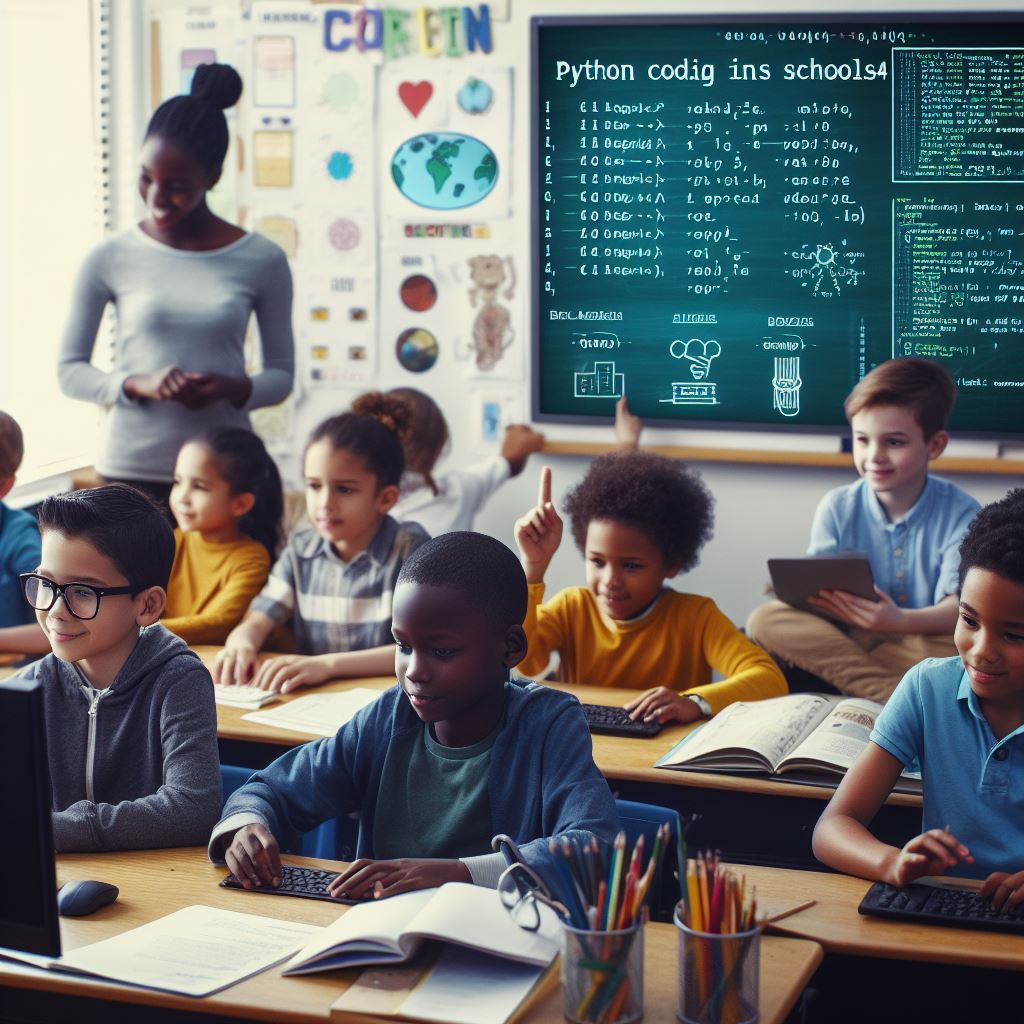Python in Education: Why Nigerian Schools Should Adopt It
Last Updated on October 18, 2023
Introduction
Python is a widely used programming language known for its simplicity and versatility. In today’s digital age, coding education has become increasingly important in schools.
The adoption of Python in Nigerian schools can greatly benefit students and prepare them for future success.
Python is a popular programming language that is easy to learn and understand.
Coding education in schools is vital as it equips students with essential skills for the future job market.
By adopting Python in Nigerian schools, students can acquire a valuable skill set that will benefit them in various industries.
Python’s simplicity allows students to focus on understanding programming logic rather than syntax intricacies.
Python can be used in various fields such as web development, data analysis, and artificial intelligence. Learning Python in schools can foster critical thinking, problem-solving, and creativity among students.
Python’s extensive libraries and resources make it a suitable choice for educational purposes.
Nigerian students can gain practical experience by working on projects using Python, enhancing their employability.
Adopting Python in schools can empower students to develop innovative solutions to local challenges.
Python’s versatility and popularity in the tech industry make it a valuable asset for Nigerian students’ future careers.
In short, the adoption of Python in Nigerian schools can greatly benefit students by equipping them with valuable coding skills and preparing them for future success.
Python’s simplicity, versatility, and industry demand make it an ideal programming language for educational purposes.
Read: Top 5 Coding Schools for Beginners in Lagos, Nigeria
Benefits of Python Education
Python has gained immense popularity in recent years and has become one of the most widely used programming languages globally.
Its simplicity and readability make Python an ideal programming language for beginners, rendering it a great choice for adoption by educational institutions in Nigeria.
Let’s explore some of the key benefits of Python education.
1. Easy to Learn
Firstly, Python’s simplicity is evident in its straightforward syntax and easy-to-understand code structure.
Beginners grasp programming concepts quickly due to this simplicity, enabling them to focus on problem-solving rather than getting caught up in complex syntax.
Unlike other programming languages that are often daunting for beginners, Python’s readability encourages students to write efficient and clean code.
2. Widely Used and Versatile
Secondly, Python’s versatility gives it a significant advantage over other languages. Python is used extensively across various industries and disciplines.
From web development to data analysis, from machine learning to automation, Python finds applications in almost every field.
Its versatility also extends to the availability of numerous libraries and resources, allowing students to explore various domains and apply Python in practical scenarios.
3. Career Opportunities
Moreover, learning Python opens up countless career opportunities for Nigerian students. The job market is witnessing a surge in demand for Python skills.
From software development to data science, companies worldwide are actively seeking professionals proficient in Python.
By equipping Nigerian students with Python knowledge, educational institutions can prepare them for a future-ready job market and ensure lucrative career prospects.
Python’s popularity and practicality cannot be overstated. Many industry giants, including Google, Facebook, and Netflix, rely heavily on Python for their programming needs.
Its simplicity, combined with powerful libraries like Pandas, NumPy, and TensorFlow, makes Python an ideal language for data analysis and artificial intelligence.
By exposing Nigerian students to Python, they can acquire skills that are in high demand and contribute effectively to the technology-driven world.
Creativity and problem-solving skills
Additionally, Python fosters creativity and problem-solving skills in students.
Its user-friendly nature allows learners to focus on logical thinking and algorithmic problem-solving rather than struggling with complex syntax.
This approach not only enhances their programming abilities but also nurtures critical thinking and innovative solutions to real-world problems.
Furthermore, Python supports collaboration and learning in the broader programming community.
With a multitude of resources available online, students can access tutorials, documentation, and forums to expand their knowledge.
The Python community is known for its inclusivity and willingness to help beginners.
This supportive environment promotes active learning and encourages students to engage with peers, mentors, and professionals beyond their classrooms.
In summary, adopting Python in Nigerian schools can bring numerous benefits to students.
From its ease of learning to its wide range of applications and lucrative career opportunities, Python education can equip Nigerian students with the necessary skills for future success.
By embracing Python as a teaching tool, educational institutions in Nigeria can empower students to become proficient programmers and unlock their potential in the digital age.
Read: Intro to Python Data Visualization for Nigerian Businesses

Integration into Curriculum
Programming as a Core Subject
Programming has become an essential skill in today’s digital world. It is crucial to make programming a core subject in Nigerian schools to prepare students for the future.
With the rapid advancement in technology, programming skills are in high demand in various industries.
Introducing Python as the primary programming language in schools can have numerous benefits. Python is known for its simplicity, versatility, and extensive libraries.
It is beginner-friendly, making it suitable for students of all ages and backgrounds.
By including programming as a core subject, Nigerian schools can equip students with the necessary computational thinking skills.
These skills include problem-solving, logical reasoning, and analytical thinking, which are transferable to other subjects and real-life scenarios.
How Python can be integrated into the existing curriculum across various subjects
Python can be seamlessly integrated into the existing curriculum across various subjects, enhancing students’ learning experiences.
In Mathematics, Python can be utilized to solve complex equations, visualize data, and analyze patterns. It allows students to apply mathematical concepts practically and gain a deeper understanding of the subject.
In Science, students can use Python to simulate experiments, process data, and create interactive visualizations.
Python’s scientific libraries like NumPy and SciPy enable students to explore scientific concepts and conduct virtual experiments efficiently.
In Social Studies, Python can be utilized to analyze data, visualize information, and create interactive maps.
Students can explore historical events, geographical data, and demographic information using Python, enhancing their research and analytical skills.
By integrating Python into various subjects, students can witness the practical applications of programming, fostering a deeper appreciation for the subject and its relevance across different domains.
Project-Based Learning
Project-based learning is an effective approach that encourages students to apply their Python knowledge to real-world problems.
By working on projects, students develop problem-solving skills and gain hands-on experience, making their learning more engaging and meaningful.
With Python, students can create websites, develop games, build mobile applications, analyze large datasets, and much more.
These projects enable students to practice coding, debug errors, and implement their ideas, fostering independent thinking and creativity.
The benefits of practical application and problem-solving skills development
Practical application of Python in projects helps students develop essential problem-solving skills.
They learn to break down complex problems into smaller, manageable tasks and apply their programming knowledge to develop solutions.
Through project-based learning, students also develop critical thinking and creativity. They learn to think outside the box and come up with innovative solutions to real-world challenges.
Python’s flexibility and versatility allow students to experiment, iterate, and develop unique approaches, boosting their confidence and creativity.
Furthermore, project-based learning promotes interdisciplinary collaboration. Students often work in teams, combining their expertise from different subjects to solve complex problems.
This collaborative nature of Python programming fosters teamwork skills and encourages students to value and appreciate diverse perspectives.
Collaboration and Creativity
Python is widely known for its emphasis on readability and simplicity, promoting collaboration and teamwork among students.
The syntax of Python is intuitive and easy to understand, allowing students to write code together, review and provide feedback to their peers.
This collaborative environment encourages students to share knowledge, exchange ideas, and collectively solve problems.
Python’s open-source community also provides a vast collection of libraries, frameworks, and resources. Students can leverage these resources and collaborate with others to build innovative projects.
How Python can enable students to develop innovative solutions to local challenges
Python’s simplicity and versatility make it an ideal programming language for developing innovative solutions to local challenges.
By learning Python, students can address social, economic, and environmental challenges faced by their communities.
They can develop applications for healthcare, agriculture, education, and other sectors, addressing critical issues and making a positive impact.
Python’s extensive libraries for data analysis, machine learning, and artificial intelligence provide students with powerful tools to analyze complex problems and develop innovative solutions.
Integrating Python into Nigerian schools can empower students to become innovative problem-solvers and entrepreneurs, contributing to the country’s technological growth and development.
Read: Automating Excel Tasks with Python: A Nigerian Perspective
Implementation Challenges and Solutions
1. Teacher Training
Implementing Python programming in Nigerian schools comes with its fair share of challenges. One major challenge is the need to train teachers in Python programming.
Many educators in Nigeria may not have the necessary skills and knowledge to teach Python effectively.
To overcome this challenge, collaborative efforts between the government, educational institutions, and the tech industry are crucial.
By joining forces, these entities can establish comprehensive teacher training programs. These programs can provide educators with the necessary skills and knowledge needed to effectively teach Python to students.
Collaboration with tech industry professionals can bring industry expertise and practical insights into the training programs.
Moreover, the government’s involvement can ensure the availability of funding and resources required for successful training initiatives.
2. Access to Resources and Infrastructure:
Another significant implementation challenge is the limited access to computers and internet connectivity in Nigerian schools.
Many schools in Nigeria lack the necessary resources and infrastructure to support Python programming education.
Without access to computers and the internet, students may face difficulties in practising and applying their Python programming skills.
To address this challenge, partnerships with tech companies can be established.
Tech companies can provide resources and support to schools by donating computers, setting up computer labs, and improving internet connectivity.
Additionally, the government should take an active role in promoting initiatives that prioritize providing schools with the necessary infrastructure for Python education.
Furthermore, the importance of low-cost devices should be emphasized. Not all schools can afford expensive computers, but there are low-cost alternatives available in the market.
Encouraging schools to invest in these affordable devices will enable more students to have access to Python programming resources.
3. Career Guidance and Mentorship
To ensure the success of Python implementation in Nigerian schools, career guidance and mentorship programs play a vital role.
These programs can support students’ interest in Python and help them explore related career paths.
By providing career guidance, students can understand the various opportunities available in the field of Python programming.
They can gain insights into the skills required, relevant industries, and potential career trajectories. Additionally, mentorship programs are crucial to provide real-world exposure and guidance to students.
Collaborating with tech professionals and organizations can offer mentorship opportunities, where students can learn from experienced individuals in the industry.
Through mentorship, students can gain practical knowledge, seek advice, and develop a network of industry professionals.
This will not only enhance their understanding of Python but also prepare them for future employment and entrepreneurial opportunities in the tech industry.
Overall, implementing Python in Nigerian schools requires addressing various challenges to ensure its successful adoption.
Teacher training, access to resources and infrastructure, and career guidance and mentorship are key areas that need attention.
The government, educational institutions, and the tech industry collaborate actively, overcoming challenges, and fostering a conducive environment for Python education in Nigerian schools.
Read: Coding Vs Programming: What’s the Difference?
Conclusion
In conclusion, adopting Python in Nigerian schools has numerous benefits.
It enables students to develop problem-solving and critical-thinking skills. It also prepares them for the digital and technological advancements of the future.
To ensure the successful implementation of Python education, collaboration among stakeholders is crucial.
The government, educators, and industry professionals need to work together to provide the necessary resources and training.
By embracing Python in education, Nigerian schools can empower their students to become proficient in a widely used programming language.
This will ultimately contribute to the growth and development of the country’s technology sector. It is time to take action and prioritize the integration of Python in Nigerian schools for a brighter future.


